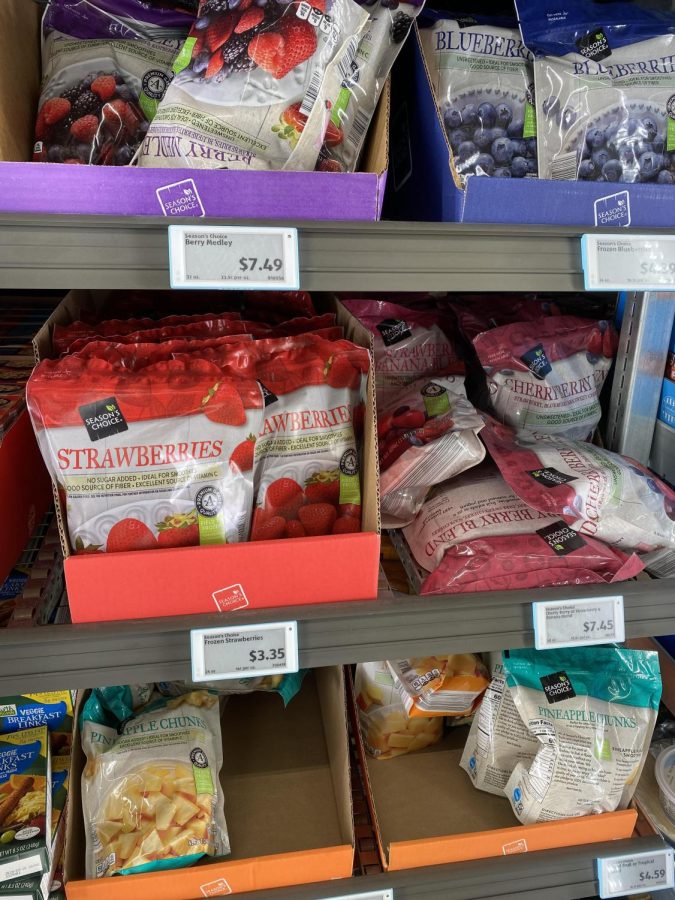The quality of American products has long been a questionable topic, from suspicious-looking deli meats to live bugs found in one’s fruits and vegetables being a common occurrence. Recently, a small outbreak of hepatitis A was reported due to the consumption of frozen organic strawberries bought at Aldi, Costco and Trader Joe’s, showing just how susceptible people are to foodborne illnesses from trusted grocers.
Freezing food has long been ingrained in human history, in which people would store foods underground during the winter months after discovering that the cold preserved their foods for a longer time. It was in 1924 when the quick freezing method was introduced, its birth mainly attributed to American inventor Clarence Birdseye.
Birdseye’s quick-freezing process laid a foundation for later innovations such as today’s digital inverter compressor technology, which saves power by slowing down when less cooling is required, and uniform cooling technology, which ensures consistent cooling in every corner of the refrigerator.
Despite the universal application of freezing technology for the world’s food supply, countries around the world, most notably the US, have faced numerous cases in which people caught illnesses from consuming frozen products.
One case of hepatitis A infection was in 1997 in Montana, GA, where frozen strawberries imported from California infected 35 people. From then on, these kinds of cases became progressively worse in the US, with 256 people infected in 1997 from frozen strawberries and 165 infected in 2013 from frozen pomegranate arils.
Just last month, five outbreak-related cases of hepatitis A were reported from Washington since March 13, which resulted in two hospitalizations. According to the Centers for Disease Control (CDC), all people affected reported eating frozen organic strawberries that were distributed to retailers nationwide.
But the possibility of contamination is not limited to just frozen fruits and vegetables; frozen meals also pose a threat to consumers’ health.
In today’s culture of constantly working and moving, consumers have become more demanding of frozen meals out of convenience and, for some, necessity.
Senior Josie Harn finds that heating up frozen meals for dinner is beneficial when she has a busy schedule. “I run and do golf, I have two part-time jobs, and I volunteer at the Humane Society, so I don’t have that much time and energy to cook. I find that frozen foods are convenient because I can just microwave them” Harn said.
A common myth in food safety is that freezing foods kills harmful bacteria. The fact is that bacteria can still be present when frozen foods are thawed; cooking food to the proper temperature is the best way to kill harmful bacteria.
Similarly, this is the same reason people can also get sick from eating at fast food chains. Most fast food chains utilize large volumes of frozen and prepacked foods, which have been processed specifically to reduce risks of foodborne illness and contamination.
However, human error does exist, and with a large number of employees at fast food chains being teenagers and young adults, they may lack appropriate training to prepare food properly or purposely choose to ignore safe food-handling processes, resulting in contaminated food.
As an employee for Portillo’s and someone who has worked in the fast food industry for years, senior Alexa Hall understands there are possible health risks when dealing with food. “Food can be easily contaminated when people are rushing to make food and don’t have time to properly wash their hands or change their gloves. There are also some people who are oblivious to hygiene or don’t care as much,” Hall stated.
Although food poisoning is a common experience, with one in ten people in the world falling ill after eating contaminated food every year, the possibility of it becoming life-threatening is real. The Centers for Disease Control (CDC) estimates 3,000 people die from food poisoning every year.
“It’s very important to properly handle foods because if we don’t follow procedures, it can cause people to get sick,” Hall continued. “At Portillos, we have tongs we use to grab frozen food so we don’t have to change our gloves and so there is a lesser chance of anything getting contaminated.”
For as much as society relies on and consumes frozen food, ensuring that products meet food safety regulations and that people are educated on how to properly handle frozen foods is of utmost importance.















